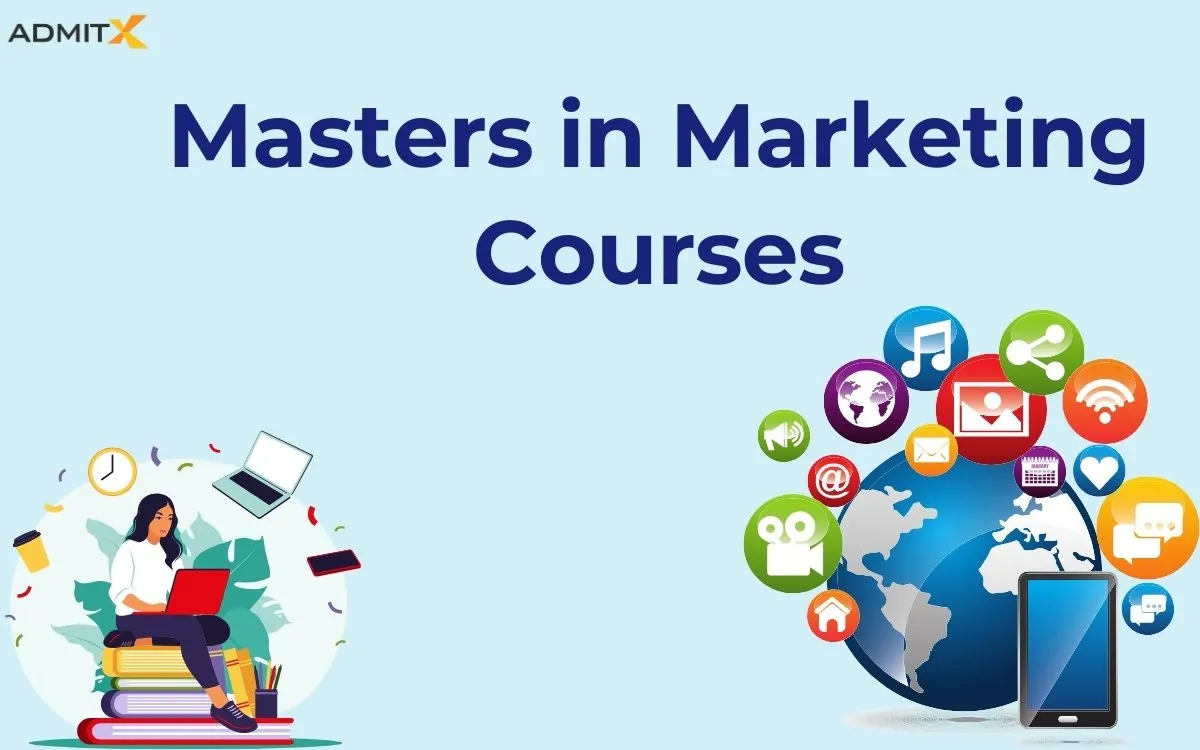
A Complete Guide to Masters in Marketing Courses
Masters in Marketing is a postgraduate degree designed to provide graduates with the skills and knowledge needed for mid-level management and senior roles in marketing. The specific area of expertise will depend on the individual’s interests, the chosen programme’s focus, and the company they work for. Potential specialisations include brand management, digital marketing, integrated marketing communications, marketing research and analytics, marketing strategy, and pricing strategy.
This blog will guide you to the course of Masters in Marketing courses and will give you a deep understanding of the top universities and the admission requirements.
Why Study MSc in Marketing From Top Universities?
A Masters in Marketing is an advanced program created to give students a more thorough understanding of marketing. It is a program that explores consumer behaviour, market analysis, branding strategies, the diverse field of digital marketing, and more. Here are the reasons why you should pursue a Masters in Marketing from top universities abroad:
- Explore contemporary issues faced by modern marketers through specialist units.
- Gain a broader understanding of business through management modules.
- Learn from the reputed faculty – research-active academics with extensive industry experience in consumer behaviour, branding, and digital marketing.
- Conduct a significant research project in a field that interests you, allowing you to develop your research and critical thinking skills.
- Earn a prestigious Chartered Institute of Marketing (CIM) qualification, highly valued by employers.
- A marketing qualification is in high demand across many industries. With a Master’s, you could work in marketing, advertising, public relations, branding, product management, or consulting.
- This degree isn’t just about marketing. It also helps you think critically, solve problems well, and communicate clearly. These skills are helpful in both your work and personal life.
Also read – Ways to Fund your Overseas Education
Top Universities And Courses Offered For MSc in Marketing
Masters in Marketing will thoroughly grasp marketing practices, plans, and the latest trends. It’s like building a strong foundation in marketing, where you’ll learn about analysing markets, building brands, using digital marketing tools, and understanding how customers behave. Here, you will get to know about the top universities for masters in marketing courses and their core subjects to get an understanding of the course structure:
| University | Location | Course | QS Business Masters Ranking 2024 | Tuition Fee | Duration |
|---|---|---|---|---|---|
| HEC Paris | Paris, France | Master in Marketing | 1 | €32,800 | 10 months |
| ESSEC Business School | Paris, France | MSc in Marketing Management Digital | 2 | €39,000 | 2-3 years (flexible), 1 year (intensive) |
| IE Business School | Madrid, Spain | Masters in Strategic Marketing and Communication | 3 | €43,300 | 15 months |
| Imperial College Business School | London, UK | MSc in strategic marketing | 4 | £37,000 | 1 Year |
| ESCP Business School | Paris, France | MSc in marketing and creativity | 4 | €26,000 | 2 Year |
| University of London | London, UK | MSc in Marketing | 91-100 | £19,171 | 12-16 months |
| University of Michigan | Ann Arbor, USA | MSc in Marketing | - | $58,615 | 12-16 months |
| Columbia Business School | New York, USA | MSc in Marketing Science | 6 | $77,156 | 3 Terms |
| ISC Paris | Paris, France | MSc in Marketing | - | 21,500 € Regular track / 13,350 € Fast track | Regular track (2 years) / Fast track (1 year) |
| King’s College London | London, UK | MSc in Marketing | - | £33,450 | 1 year |
MSc in Marketing Course Structure
The course structure of the Masters in Marketing is divided into 2 parts: core and elective. Some universities also ask for dissertations. Here is a list of masters in marketing courses which are generally offered by the university at large:
Core:
- Applied Statistical Modeling
- Marketing Management
- Graduate Marketing Research
- Advanced Marketing Management
- Understanding Customers
- Advertising and Promotion
Electives:
- Developing and Interpreting Financial Information
- Not-for-Profit Accounting
- Cost Management
- Economic Analysis: Firm and Consumer
- Management Science
- Data Mining for Business Applications
- Fundamentals of Program Management
- Project Management and Control
- Sales Management and Personal Selling
- Global Marketing
- Operations Management
- Supply Chain Management
- Product Development and Technology Management
- Politics of Public Policy
- Introduction to Public Administration
- Graduate Seminar
- Dissertation Part 1 and 2
Eligibility Criteria For MSc in Marketing
The specific requirements for a Masters in Marketing vary depending on the university and your chosen location. This guide will outline the requirements for masters in marketing:
Educational Background:
Most universities expect applicants to hold an undergraduate degree (or its equivalent) in a relevant field, such as marketing, business administration, or communication.
Standardised Tests:
Some universities may require scores from standardised tests like the GMAT or GRE. These tests assess your analytical, mathematical, and verbal reasoning skills.
English Language Proficiency:
If English isn’t your first language, you’ll likely have to showcase your proficiency. The most common tests are the IELTS and TOEFL. The minimum score requirements vary but typically range from 6.0-6.5 for the IELTS and 72-100 for the TOEFL (iBT).
Career Opportunities After MSc in Marketing
This program provides students with deep consumer behaviour and strategic marketing knowledge, setting them up for successful careers. Here are some exciting job opportunities that Marketing graduates can expect:
- Digital Marketing Manager: These experts use online channels to build marketing campaigns. They improve a company’s website and online presence and analyse the results to see what works best and attracts more customers.
- Brand Managers: They develop brand plans, manage how people see the brand, oversee product launches, and ensure the brand message stays consistent everywhere.
- Market Research Analyst: They gather information about market trends, what customers like, and what competitors do. They use this information to help companies make better decisions about marketing and their business overall.
- Marketing Consultant: Marketing consultants are like advisors who help companies with their marketing plans. They assess the market, develop marketing strategies, and improve how companies market themselves.
- Product Marketing Manager: They decide how to position the product in the market, create messages to sell it, develop pricing strategies, and plan to launch it successfully. Their goal is to ensure the product is a hit!
- Advertising and Promotions Manager: They aim to make the brand more visible, attract customers, and achieve marketing goals. They use creative advertising to drive sales and brand awareness.
- Social Media Manager: They manage the company’s social media accounts, create content to engage with followers, track performance, and run social media campaigns to build brand awareness and loyalty.
| Job Role | Average Salary | Top Recruiters |
|---|---|---|
| Digital Marketing Manager | $70,000 - $120,000 (INR 58 Lakhs- 1 cr) | Google, Facebook, Amazon, HubSpot |
| Market Research Analyst | $50,000 - $80,000 (INR 41 Lakhs- 66 Lakhs) | Nielsen, Ipsos, Kantar, GfK |
| Advertising Manager | $60,000 - $100,000 (INR 50 Lakhs- 83 Lakhs) | Ogilvy, WPP, Dentsu, Publicis |
| Marketing Consultant | $70,000 - $100,000 (INR 58 Lakh- 83 Lakhs) | McKinsey & Company, Boston Consulting Group, Deloitte |
| Brand Manager | $60,000 - $100,000 (INR 50 Lakhs- 83 Lakhs) | Procter & Gamble, Unilever, Coca-Cola, L'Oréal |
| Product Marketing Manager | $80,000 - $120,000 (INR 66 Lakhs- 1 cr) | Apple, Microsoft, Adobe, Salesforce |
| Social Media Manager | $50,000 - $80,000 (INR 41 Lakhs- 66 Lakhs) | Airbnb, Nike, Starbucks, Red Bull |
Country-Wise Average Salary
Here is a list of average salaries depending on the countries offering masters in marketing courses:
| Country | Average Annual Salary |
|---|---|
| UK | £42,500-£100,000 (INR 45L-1.05 Cr) |
| USA | $60,000- $90,000 (INR 50 L-75L) |
| Europe | €65,082-€79,028 (INR 58L-70L) |
| Australia | AUD 60,000-AUD 90,000 (INR 33L-50L) |
| Singapore | SGD 80,000- SGD 120,000 (INR 49 L-70L) |
Documents Required For Admission to MSc in Marketing
You must submit the mandatory documents to get admission to reputed universities for masters in marketing. Here is a list of necessary documents to fulfil the admission requirements for masters in marketing:
- Application Form: Obtain the application form from your chosen university. This will require you to provide details about yourself and your educational background.
- Academic Transcripts: Submit official transcripts from your previous institutions, including your undergraduate degree. These documents showcase your educational achievements.
- Letters of Recommendation: You’ll usually need two or three reference letters from academic or professional contacts who can speak to your skills, abilities, and suitability for the programme.
- Statement of Purpose/Personal Statement: Write an essay outlining your career aspirations, what motivates you, and how a Master’s in Marketing will help you achieve those goals.
- CV: Provide a comprehensive CV detailing your academic qualifications, work experience (including internships), involvement in relevant activities, and any achievements you’ve earned.
- Standardised Test Scores: If the university requires them, submit your official GMAT or GRE scores along with your application.
- English Language Proficiency Scores: If English isn’t your first language, you must submit scores from an accepted English language test like IELTS or TOEFL.
- Application Fee: Most universities charge an application fee, the amount of which varies depending on the institution.
Conclusion
Pursuing an Masters in Marketing can be a transformative experience. The course structure offered by the degree makes you understand the marketing principles and practices, hone your existing skills, and introduce you to new ones. You’ll be qualified for more senior positions and roles requiring specialised knowledge.
FAQs
Is it worth it to take a Master's degree in Marketing?
Whether a Masters in Marketing is worthwhile depends on your career goals and circumstances. Here are some factors to consider:
- Career Advancement: A Master’s can qualify you for more senior marketing positions and roles requiring specialised knowledge, leading to faster career growth.
- Enhanced Skills and Knowledge: The programme deepens your understanding of marketing principles and helps you with the latest trends and tools. This can make you a more valuable asset to employers.
- Earning Potential: Graduates with a Master’s often earn higher salaries than those with only a bachelor’s degree.
What is the difference between an MSc in Marketing and an MBA in Marketing?
The main difference lies in focus:
- Master’s in Marketing (MSc): Specialised program focused on marketing theory, research, and practical applications. Ideal for those seeking in-depth marketing knowledge.
- MBA in Marketing: Broader business administration program with a marketing specialisation. Provides a well-rounded understanding of business alongside marketing expertise. Ideal for those aiming for leadership roles or careers requiring a broader business context.
What would be my job prospects after doing an MSc in marketing?
- A Master’s in Marketing opens doors to a variety of exciting careers, including:
- Brand Marketing Manager
- Digital Marketing Specialist
- Market Research Analyst
- Product Marketing Manager
- Marketing Consultant
Is there financial aid available for Master's in Marketing programmes?
Financial aid options may be available depending on the university and your circumstances. These could include scholarships, grants, and student loans. Researching the financial aid options offered by your universities is essential.
How long does a Master's in Marketing typically take?
The duration can vary depending on the programme structure. Full-time programmes typically last one year, while part-time options take two to four years.
If you are an aspirant looking to study at your dream university, book an appointment with AdmitX today and start your applications early to avail yourself of all the benefits.








